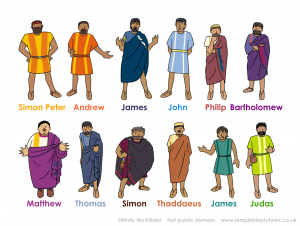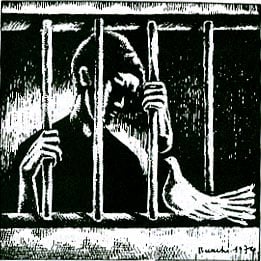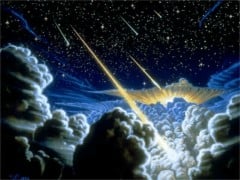 Jesus tells his first disciples, “I will make you fishers of men.” It’s a more aggressive start to the Kingdom of God than you might think. Jesus echoes the prophets Jeremiah and Amos. They prophesied that oppressors of the people will be dragged away with fishhooks. Fourth in a series on “The Worldly Spirituality of Mark’s Gospel” with help from Ched Myers’ Binding the Strongman: A Political Reading of Mark’s Story of Jesus. The Introduction and Table of Contents are HERE.
Jesus tells his first disciples, “I will make you fishers of men.” It’s a more aggressive start to the Kingdom of God than you might think. Jesus echoes the prophets Jeremiah and Amos. They prophesied that oppressors of the people will be dragged away with fishhooks. Fourth in a series on “The Worldly Spirituality of Mark’s Gospel” with help from Ched Myers’ Binding the Strongman: A Political Reading of Mark’s Story of Jesus. The Introduction and Table of Contents are HERE.
After John had been arrested, Jesus came to Galilee proclaiming the gospel of God. (1:14)
In this series we are exploring the context of politics and danger surrounding the Kingdom of God that Jesus preached. The danger is clear right away. Jesus begins his mission “after John had been arrested.” Mark’s use of the politically colored word “gospel” sharpens the political edge of the situation. Then comes Jesus’ message:
The kingdom of God is at hand. Repent, and believe in the gospel.
It’s about as dramatic as you can get. “At hand” means really close, on the verge. But Mark frustrates our enthusiasm for kingdom building or kingdom conquering. Next up is a scene with some ordinary fishermen and the Sea of Galilee. Jesus is starting to do something, but what possible kingdom starts this way?
Mark has twice before frustrated our expectations. A prophecy from Isaiah seems to point to John the Baptist, but the Baptist tells about someone stronger. Jesus appears on the scene with a divine manifestation (at least for Mark’s readers) but immediately goes off to the desert alone. Why the drama and then all of a sudden the interruption?
It turns out there’s a good reason. Roman occupation is one hindrance to any new kingdom. But just as big a problem, for Jesus, are Jewish expectations and Jewish triumphalistic nationalism. Mark’s Jesus has a politics of a different sort. Mark is carefully carving out a territory between withdrawal from political concerns and holy war.
Fishers of men
In the next section Mark bravely “soldiers” politically on with what Ched Myers (page 132) calls the most misunderstood of Jesus’ expressions: fishers of men.
Come after me and I will make you fishers of men. (Mark 1:17)
That is what Jesus says to Simon, Andrew, James, and John, whom he encounters engaged in the occupation of fishing. This expression is not about catching recruits for Jesus, a harvest of souls for the Kingdom of God. A completely different kind of catching is coming. Mark’s image recalls passages from the prophets Jeremiah and Amos:
Look! I will send many fishermen, says the Lord, to catch them [Israel’s leaders]. … For my eyes are upon all their ways; they are not hidden from me, nor does their guilt escape my view. (Jeremiah 16: 16-17)
And:
You who oppress the weak and abuse the needy … truly the days are coming upon you when they shall drag you away with hooks, the last of you with fishhooks…. (Amos 4:1-2)
Jesus’ assignment for these fishers of men isn’t much like attracting groupies around some charismatic leaders. It’s more like the dangerous task of living an accusation against the world’s powerful oppressors.
A new social and economic order
When reading Mark’s account of the call of those first disciples, the power of Jesus’ personality immediately stands out. He says, “Come after me,” and they do, not even knowing what “fishers of men” is about. Somewhat later one is struck by something else. Simon, Andrew, James, and John had families and responsibilities. They were not wealthy but still men of some substance, not the really unfortunate ones, the day laborers, much of whose time was spent waiting and hoping for someone to hire them for a day. They had things to do and, in fact, were in the middle of their jobs when Jesus called. Was it a good idea to leave everything half done and follow Jesus? Was it right?
Important scholars like Albert Schweitzer and his school once taught that Jesus expected that the end of the world was coming soon. In Chapter 13 of Mark’s Gospel Jesus says things like that the sun will be darkened and stars will fall. I figured that made humdrum, daily occupations quite a bit less important. But the world-ending interpretation of that passage and other apocalyptic strains in the New Testament is less common today. Unfortunately, a fringe crowd still gets caught up in predictions of the world’s end.
Jesus is not expecting the imminent end of the world, but still he has his first disciples leave their daily occupations. It’s not that they should abandon all social and economic relationship. Jesus is all about a fundamental reordering. “This is not a call out of the world, but into an alternative social practice,” Myers says. (page 133) Jesus’ first fishers of men have yet to learn what that alternative is.












